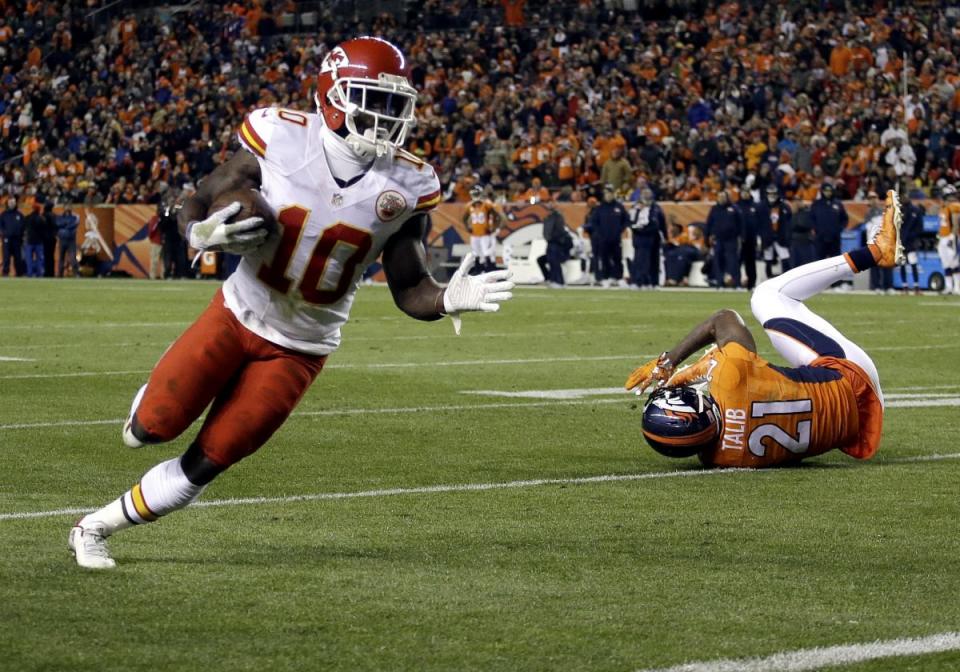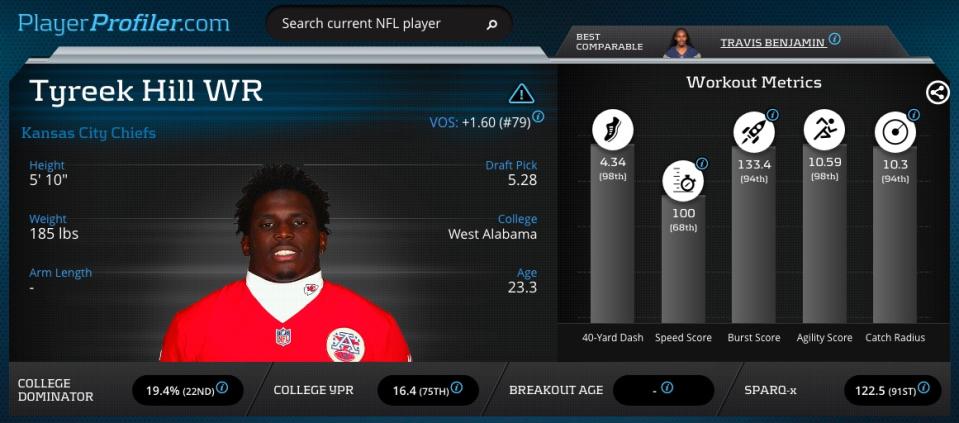Plenty of statistical reasons to fade Tyreek Hill this fantasy season

PlayerProfiler.com, Special to Yahoo Sports
By Zach Krueger
Since the release of Jeremy Maclin, Tyreek Hill’s value seems to have exploded given his elite speed and athleticism, and flashes of success in his 2016 rookie season. Football Twitter then went nuclear when Andy Reid declared Hill the team’s No. 1 receiver heading into 2017.
Wow Factor
Hill is an explosive player, no doubt. His ability in the return game is without question. That being said, strictly looking at Hill as an offensive player and viable fantasy option comes with a lot of unknowns and concerns, beginning with his 9.7 yards per reception, and 7.2 yards per target (No. 68) in 2016.
[Fantasy Football is open! Sign up now]
From an athletic profile standpoint, Hill projects as an elite player capable of making plays in space and turning the ball up field. His 4.34 40-yard dash time (98th-percentile), 133.4 Burst Score (94th-percentile), 10.59 Agility Score (98th-percentile) and 10.40 Catch Radius (94th-percentile) make him an athletic force to be reckoned with. However, Hill’s 19.4-percent (22nd percentile) College Dominator Rating is glaring red flag. In fact, Hill is one of only a handful of small-school receivers in the PlayerProfiler.com Database with College Dominator Rating below the 25th percentile.
Underwhelming Size and Target Depth
Unfortunately for Hill, his underwhelming size and limited route tree contributed to his poor yards per reception. As Anthony Amico (follow him on Twitter at @amicsta) points out on RotoViz, Hill is a player you need to avoid. Hill’s 5-foot-10, 185-pound frame diminishes his likelihood of a sustained breakout. The second-year receiver would enter unique territory should he reach the 1,000 receiving yards plateau, as only 20 wide receivers weighing 185 pounds or less have managed to achieve such a feat since 1997.

In looking at recent yards per reception for Kansas City Chiefs receivers since Alex Smith took the reigns in 2013, one number stood out in rather glaring fashion. That stat being the lack of yards per reception receivers under Smith’s watch have produced. The lack of arm strength Smith possesses has never been a secret, and it’s more evident than ever when trying to find a receiver who truly stretched the field successfully with Smith at the helm.
Since 2013, no wide receiver for the Chiefs has posted higher than a 14.9 yards per reception, that player being Donnie Avery in 2013. Since that time, no Chiefs receiver with a minimum of 50 targets has achieved a YPR higher than 12.9 (Albert Wilson, 2015), and only one receiver has topped 1,000 receiving yards with smith under center (Maclin, 1,088 yards in 2014). Simply put, Smith does little in the way of supporting fantasy viable receivers, and in a league of 32 starting quarterbacks, ranked No. 33 in average attempt distance in 2016 with 6.8 yards.
We are also just two seasons removed from the 2014 season in which Chiefs receivers combined to catch approximately zero touchdown passes. While the lost season for Chiefs receivers should be viewed as a complete anomaly, there’s no denying it happened, and in a season where Smith played 15 games.
Hill commanded an impressive 83 targets last season, but his average target distance checked in at a meager 8.3 yards, the third lowest among Chiefs receivers. Hill’s low target depth also yielded little in return, as he averaged only 4.5 yards after catch. Hill’s lack of air yards was also alarming for a player who is now perceived to be taking over the top receiving slot in an already anemic pass offense, because air yards really matter.
To summarize, the Chiefs are now asking a gadget player who averaged 9.1 yards per reception in his only season at a major conference college program, posted a 19.4-percent College Dominator Rating at West Alabama in 2015, posted a 9.8 yards per reception and finished outside the top-75 in air yards as a rookie, to assume No. 1 WR duties in his second year in the NFL? This is the Peter Principle in action in the NFL. Kansas City is pushing Hill out of his depth and setting him up to fail spectacularly in his sophomore season.
Route Tree and Context Concerns
Hill was efficient in his overall rookie season, evidenced by a 73.5-percent (No. 8) catch rate. Last season, he ran screens, slants, flat routes, curls, comebacks and “other” routes a total of 47.8-percent of the time. The frequency of these routes being run becomes alarming when you consider the shorter distance these routes tend to be run at, and the fact that they are all routes which keep Hill near the line of scrimmage. Had Hill turned these short yardage opportunities into big plays turned up field, this wouldn’t be a problem, but we’ve already identified his dismal 4.5 yards after catch.

Hill’s route tree was dominated by go/nine routes (23.9-percent in 2016). Success on deeper routes by players possessing similar speed and athleticism to Hill illuminate their value, but in the context of the Chiefs’ offense, this is a concern.
Smith infamously refuses to reward deep separation. Smith’s averaged a 6.8-yard (No. 33) attempt distance in 2016 and his deep pass attempts have finished near league-bottom each of the last three years:
2016: 46 deep passes
2015: 36 deep passes
2014: 29 deep passes
In 2016, Hill ran less 30-percent of the deep and intermediate routes that require feel and nuance: out, comeback, dig, curl, post, corner (that Smith typically rewards). Hill must significantly diversify his route tree as a sophomore to align with Smith’s strengths and tendencies. The Chiefs are asking a lot of a player who has never possessed a comprehensive route inventory or operated as the primary receiver for a football team at any level (recall the 19.4-percent College Dominator Rating).
Sell Tyreek Hill
The hype surrounding Hill is very real, but the reasoning is based solely on athleticism, which is less predictive than college production. Hill is a low floor, low ceiling player primed for a sophomore slump in 2017.
Check out Tyreek Hill on the Updated PlayerProfiler Dynasty Rankings:
The big play potential for Hill is there, but his 2016 efficiency is unsustainable without a dramatically diversified route inventory and the complete reinvention of Smith. If you’re a believer in the sell high theory in Fantasy Football dynasty leagues, and you own Hill, you’re getting on the phone with league mates who are often intoxicated by wow factor plays, and selling Hill at peak value before the 2017 season begins.
Despite the offseason hysteria, a comprehensive review of Hill’s complete football résumé indicates that if you have a chance to sell, push the button now.
More from Yahoo Sports:



